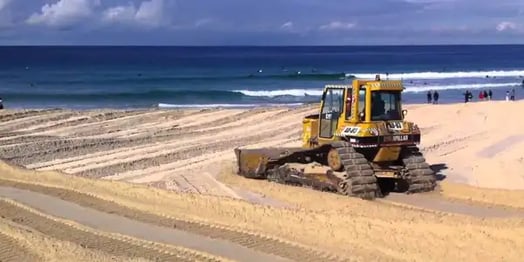One-third of South Florida’s beaches are now “critically eroded” thanks to storms (like Hurricane Irma, which stripped beaches of 170k cubic yards of sand), inadequate maintenance, and aggressive coastal development.

And with the local sand kegs kicked, Florida’s hoping to buy some of those good grains from their neighboring beach bros, the Bahamas.
Unfortunately, sand doesn’t grow on palm trees
It’s actually a finite resource, and there’s an estimated $70 billion industry around extracting it from riverbeds and offshore beaches for construction (it’s used in concrete) or to battle erosion in places like Florida.
Typically, beach managers will ship sand in from inland mines, but with nearby stateside sources virtually depleted, Floridians are looking at their options overseas.
Only one problem: Foreign sand imports are illegal in the US
A large portion of beach restoration funding comes from the federal government — but a 1986 environmental law prohibits federal spending on foreign sand if domestic sand is available.
That means beach managers have to ship from farther and farther inland, making it much costlier than foreign options.
But the SAND Act could change all that
“SAND” stands for Sand Acquisition, Nourishment, and Development (You can’t name the acronym the first word of the acronym! *said in Seinfeld voice*)
Senator Marco Rubio proposed it early this year at the behest of South Florida citizens and newspapers — and beachgoers alike. And, with any luck, legislators will answer their S.O.S.
